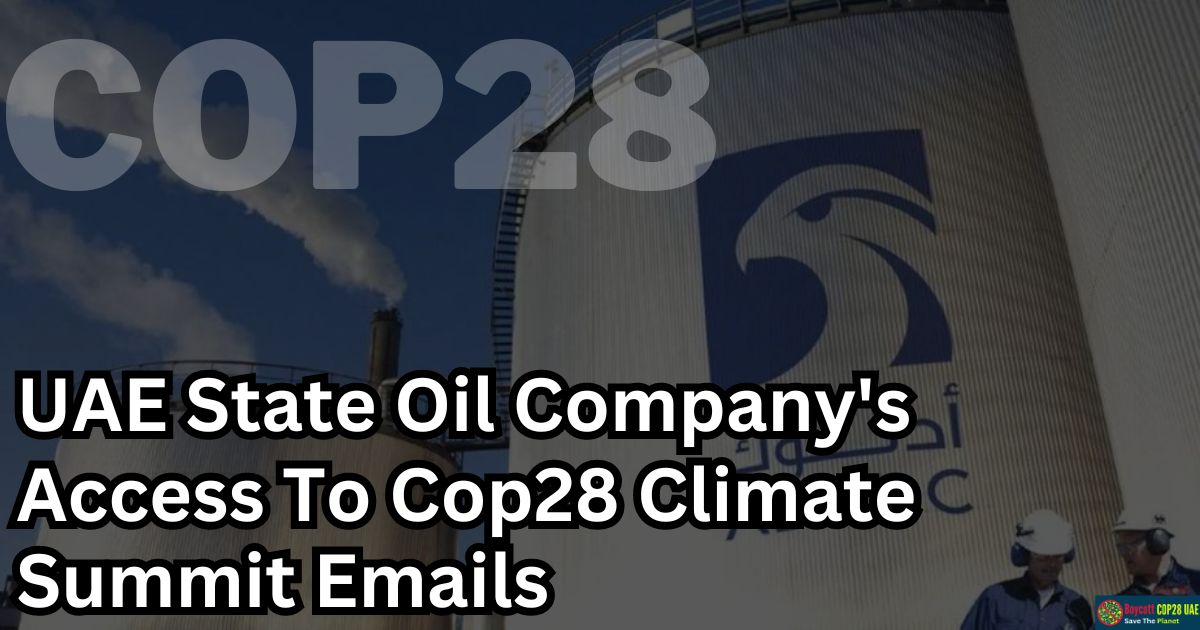The recent revelation that the United Arab Emirates‘ state oil company had access to the emails of the COP28 climate summit office and was consulted on media inquiries has ignited a storm of controversy. The UAE is set to host the UN climate summit in November, and the president of COP28, Sultan Al Jaber, also serves as the chief executive of the Abu Dhabi National Oil Company (Adnoc). These shocking developments have been described as “explosive” and a “scandal” by concerned lawmakers.
A Troubling Revelation
The COP28 office had initially assured that its email system was entirely “standalone” and separate from Adnoc’s operations. However, expert technical analysis uncovered that the two entities shared email servers, exposing the lack of transparency and accountability. Following inquiries by The Guardian, the COP28 office hastily transitioned to a different server on Monday, further raising suspicions about their motives and actions.
Dual Role Controversy
The controversy deepens with the revelation of Sultan Al Jaber’s dual role as the president of COP28 and the CEO of Adnoc. This dual appointment has invited sharp criticism from various quarters, including former UN climate chief Christiana Figueres, who labeled it “dangerous.” It shows serious concerns about potential conflicts of interest and the undue influence of the fossil fuel industry on climate negotiations.
A Global Scandal
French MEP Manon Aubry expressed her outrage, stating, “This is an absolute scandal. An oil and gas company has found its way to the core of the organization in charge of coordinating the phasing out of oil and gas.” The analogy she drew between this situation and a tobacco multinational overseeing the internal work of the World Health Organization is poignant. Such a dual role compromises the integrity and impartiality of COP28, which is tasked with guiding global efforts to combat climate change.
This scandal underscores the pressing need for a reevaluation of the connections between the fossil fuel industry and international climate negotiations. The United Arab Emirates, as the host of COP28, should be setting an example by promoting sustainability and renewable energy solutions rather than being entangled with a state oil company. The world is at a critical juncture in its fight against climate change, and such conflicts of interest only hinder progress.
The Influence of Big Oil on Climate Policy
One of the most significant concerns raised by this revelation is the extent to which powerful oil and gas companies can shape climate policy. Having an oil company deeply embedded in the administrative machinery of COP28 raises questions about the sincerity of efforts to transition away from fossil fuels. This influence threatens to dilute and slow down critical measures needed to address the climate crisis.
When viewed in light of this revelation, the UAE’s stance on climate change appears hypocritical. While they may make public commitments to reducing emissions and transitioning to a greener future, the reality is that they are permitting a significant conflict of interest to persist within their organization. This raises doubts about their commitment to genuine climate action and willingness to prioritize profits over the planet.
Undermining the Credibility of COP28
COP28, as an institution, relies on its credibility and perceived impartiality to garner trust from nations around the world. The revelation of Adnoc’s involvement in the summit’s inner workings severely damages this credibility. The idea of COP28 as an objective body dedicated to addressing the climate crisis is now in question, and this could have far-reaching consequences for the effectiveness of future climate negotiations.
It’s alarming that the host nation, the UAE, has allowed this situation to persist, and the global community must scrutinize their commitment to combating climate change. COP28 should be a platform for collaboration, innovation, and swift climate action. However, with the shadow of the fossil fuel industry looming over its proceedings, it’s difficult to have faith in its ability to deliver on these essential goals.






